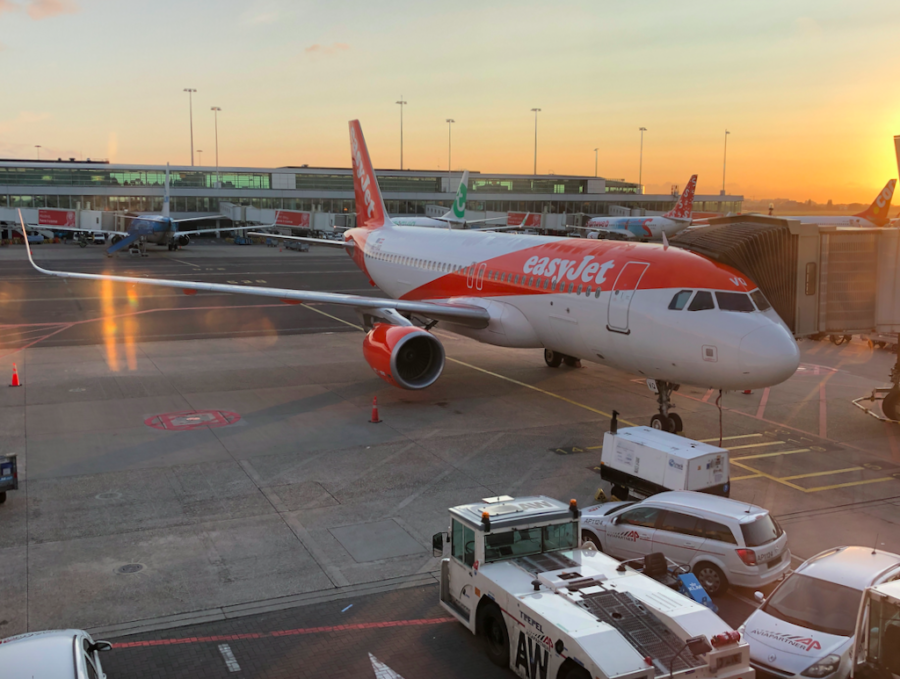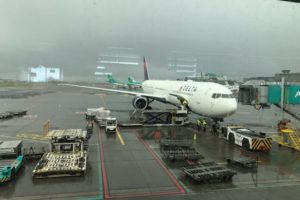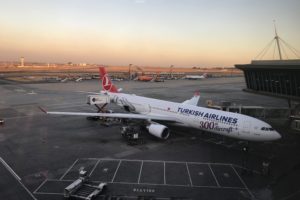Airline Profile: EasyJet
The Facts:
| Alliance | N/A |
| Competitors | Ryanair Wizz Air Vueling Eurowings Transavia |
| Fleet Count | About 330 |
| Founded | 1995 |
| Frequent Flyer Program | EasyJet Flying Club |
| Headquarters | Luton, England |
| Major Focus Cities | Amsterdam Basel Mulhouse Freiburg Berlin Schoenefeld Berlin Tegel Bristol Geneva London-Gatwick London-Luton Manchester Milan-Malpensa Nice Paris Charles de Gaulle Venice |
| Parent Company | EasyJet PLC |
| Skytrax Rating | 4 (out of 5) |
| Subsidiaries | EasyJet Europe EasyJet Switzerland |
| Travel Classes | Economy |
| Type of Airline | Low-cost |
| Website | easyjet.com |

7 Things You Need To Know About EasyJet
- Aircraft Registrations: EasyJet actually is comprised of three separate airlines. However, all aircraft in the EasyJet group share the same livery and interiors. This is because the only difference between the three airlines is the aircraft registration. For legal and political (Brexit) purposes, EasyJet has aircraft registered in the United Kingdom (where the airline is headquartered), in Austria, and Switzerland. Its subsidiary with planes registered in Austria is named EasyJet Europe and was founded in 2017 in order to retain an Air Operators Certificate in the European Union with Brexit. EasyJet Switzerland is the remains of the airline TEA Switzerland, which EasyJet bought in 1998, and EasyJet has since decided to register a few aircraft in Switzerland.
- Aircraft: EasyJet is the operator of only one aircraft model – the Airbus A320. They used to operate some Boeing 737s, although those have all since been retired since 2011. It historically mostly only operated the Airbus A319 and the Airbus A320, although they recently took delivery of Airbus A320neos and Airbus A321neos, which is the airline’s largest aircraft, and are configured in the Airbus Cabin Flex Configuration, allowing the aircraft to have extra capacity. EasyJet also offers no form of in-flight entertainment onboard besides its magazine and its advertisements which it sticks to the seat in front (like Ryanair).
- In-Flight Cabin: EasyJet operates in a one-class configuration. That means that they do not have any premium cabin on any of their aircraft. EasyJet operates with a very dense configuration, as all of its aircraft seats only have 29 inches of legroom! Comparably, Delta operates its Airbus A321s with 31 inches of legroom in regular economy class, while Ryanair operates their 737s with 30 inches of legroom, which is one inch more than on EasyJet. If you are tall and fly on EasyJet, I would recommend that you purchase an exit row seat or a bulkhead seat, as those seats have significantly more legroom, and are available for a fee or are free if you are an EasyJet Plus member. If not, you can select seats for a fee, although that fee is higher if you book an Up Front seat, which are in rows 2-5 or 6. You can select Up Front (or any other seat) for free if you book a Flexi fare.

- Baggage Allowance: EasyJet has rather complicated baggage allowance fees. For checked baggage, you can select one of three weight options – 15kg (33lbs), 23kg (50lbs), or 32kg (70lbs). Prices for checked luggage per flight varies drastically depending on luggage size and flight length. I do commend EasyJet for offering different prices for different baggage weights, so that you don’t have to pay the full price if you only check a lightweight bag, like most airlines charge. EasyJet also has a unique (but awful) hand luggage policy. You are allowed to bring one “cabin bag,” which has the dimensions of 56x45x25cm, which is about the size of a regular carry-on. One unusual thing to note is that regular passengers are not allowed to bring a personal item on board that can fit under the seat in front of you such as a laptop bag or a handbag, which is something very unusual. Usually, low-cost airlines allow a free personal item but not a carry-on, instead of vice versa (like EasyJet). However, EasyJet Plus Cardmembers, Flexi, Upfront, and Extra Legroom passengers are allowed to bring a personal item such as a computer bag onboard.
- Food & Beverage: As a low-cost carrier that only operates on short-haul routes, EasyJet doesn’t provide any free onboard meals. However, it does offer food and beverages for purchase. EasyJet does have a rather large selection of meals and snacks for a low-cost carrier. On longer flights, they offer full meals including calzones, snack boxes (like on US carriers), croissants, and sandwiches. They also offer smaller snacks such as candy bars, and meal deals that include a meal, snack, and drink. Their onboard meal services are actually nearly identical to the ones available on domestic flights on United, Delta, and American with both small meals and beverages available for purchase.
- Route Network: EasyJet tends to have a pretty similar route network to Ryanair. Like Ryanair, EasyJet operates out of a few dozen bases, where they fly (mostly) point-to-point destinations within Europe, both focused for business and leisure travelers. However, unlike Ryanair which focuses on both eastern and western Europe, or Wizz Air, which primarily has bases in eastern Europe, EasyJet has bases (and flies almost solely within) almost completely in western and southern Europe. However, they do also fly to a few destinations in Africa and the Middle East from Europe; they fly to numerous destinations from Europe to Morocco and Turkey and also fly to a few destinations in Israel and Egypt.
- EasyJet Plus: EasyJet offers a rewards card that offers many benefits which it labels the EasyJet Plus Card. Its annual membership is £215 and comes with a variety of benefits. Firstly, you have access to Upfront and Extra Legroom (bulkhead and exit row) seating, which can be a lifesaver to tall people. Secondly, it offers dedicated bag desks so that you don’t have to wait in line as long. Thirdly, it gives you fast track security at some airports and priority boarding. Fourth, you can bring a personal item on board (45 x 36 x 20cm), and you can also make free same-day flight changes. In addition, you can get 10-20% off of lounge access (regular passengers can also book lounge access, although usually paying for one-time lounge access is rather pricey and not worth it unless you have a long connection). Overall, the membership does provide a lot of benefits, but it is pretty pricey, so I wouldn’t recommend it unless you fly EasyJet at least once a month.
Have you ever flown on EasyJet? Share about your experience below in the comments section!




